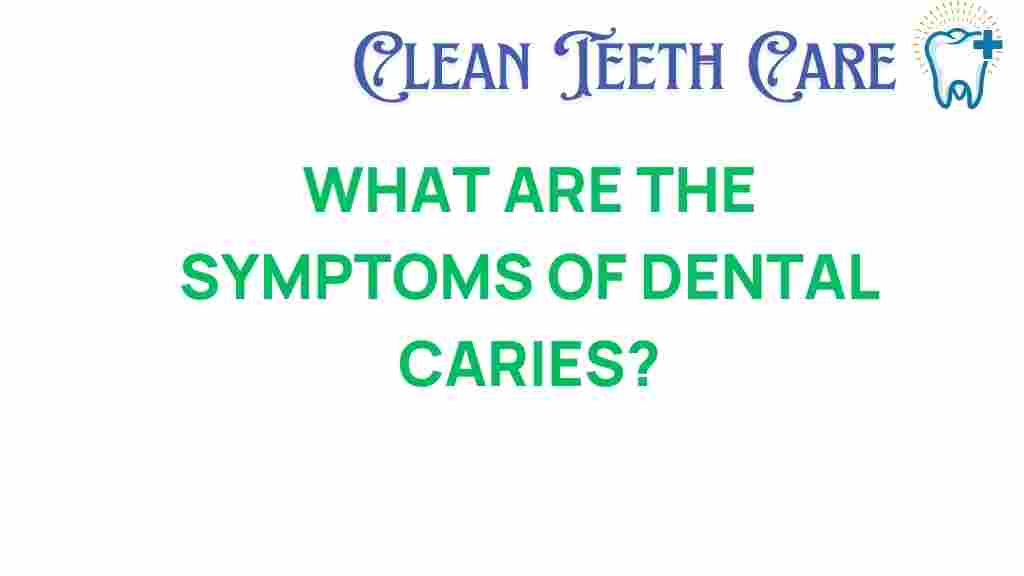Uncovering the Hidden Symptoms of Dental Caries
Dental caries, commonly known as tooth decay or cavities, is a prevalent issue that affects individuals of all ages. While many are aware of the visible signs of dental caries, such as holes in the teeth or severe pain, there are numerous hidden symptoms that can indicate the onset of this condition. Understanding these early signs is crucial for maintaining optimal oral health and preventing further decay. In this article, we will delve into the symptoms of dental caries, their prevention, and effective dental hygiene practices.
Understanding Dental Caries
Dental caries is a progressive disease that results in the demineralization of the hard tissues of the teeth. It is primarily caused by the interaction of bacteria and sugars in the mouth, leading to the production of acids that erode tooth enamel. If left untreated, dental caries can lead to severe complications, including tooth loss and systemic infections.
Identifying Symptoms of Dental Caries
Recognizing the symptoms of dental caries early can help prevent more serious oral health issues. Here are some common and hidden symptoms to watch for:
1. Early Signs of Tooth Decay
- White Spots: One of the earliest signs of dental caries is the appearance of white spots on the teeth. These spots indicate demineralization of the enamel and can be reversed with proper dental care.
- Sensitivity to Temperature: If you experience discomfort when consuming hot or cold foods and beverages, it could be a sign of tooth decay.
- Bad Breath: Persistent bad breath, or halitosis, can be a sign of bacteria buildup due to cavities.
2. Advanced Symptoms of Dental Caries
- Toothache: A sudden, severe toothache can indicate a cavity that has progressed deeper into the tooth.
- Pain When Biting: If you feel pain while biting down, it may indicate that decay has reached the tooth’s nerve.
- Visible Holes or Pits: As cavities develop, they can create visible holes in the teeth, which should be addressed immediately.
3. Symptoms Related to Gum Health
- Swollen or Bleeding Gums: Gum health is closely related to dental caries. Swollen or bleeding gums can indicate inflammation caused by decay.
- Receding Gums: If your gums appear to be pulling away from your teeth, it may be a sign of advanced decay or periodontal disease.
Preventing Dental Caries
Prevention is the best strategy when it comes to dental caries. Here are effective ways to keep your teeth healthy and cavity-free:
1. Maintain Good Dental Hygiene
- Brush Twice Daily: Use fluoride toothpaste and brush for at least two minutes each time.
- Floss Daily: Flossing removes food particles and plaque from between the teeth, where a toothbrush cannot reach.
- Use Mouthwash: An antibacterial mouthwash can help reduce plaque and prevent cavities.
2. Regular Dental Check-Ups
Visiting your dentist regularly for check-ups and cleanings is crucial. During these visits, your dentist can:
- Identify early signs of dental caries.
- Provide professional cleaning to remove plaque and tartar.
- Apply fluoride treatments to strengthen tooth enamel.
3. Dietary Choices
- Limit Sugary Foods and Drinks: Sugar is a primary contributor to tooth decay. Reducing your intake can significantly lower your risk.
- Eat a Balanced Diet: Include plenty of fruits, vegetables, and whole grains to promote overall oral health.
- Stay Hydrated: Drinking water, especially fluoridated water, helps wash away food particles and bacteria.
Step-by-Step Process for Maintaining Oral Health
Maintaining oral health requires a consistent routine. Here’s a step-by-step guide:
Step 1: Daily Dental Care Routine
- Brush your teeth twice a day with fluoride toothpaste.
- Floss between your teeth at least once daily.
- Use an antibacterial mouthwash to rinse after brushing.
Step 2: Regular Dental Visits
- Schedule dental check-ups every six months.
- Discuss any concerns or symptoms with your dentist during visits.
- Follow your dentist’s recommendations for treatments or preventive measures.
Step 3: Educate Yourself on Dental Care
Stay informed about oral health through reputable sources or your dentist. Understanding dental caries, symptoms, and prevention techniques can empower you to take control of your oral hygiene.
Troubleshooting Common Dental Care Issues
Even with a good dental care routine, issues may arise. Here are some troubleshooting tips:
1. Dealing with Tooth Sensitivity
If you experience tooth sensitivity:
- Try using toothpaste designed for sensitive teeth.
- Avoid very hot or cold foods until sensitivity decreases.
- Consult your dentist for potential underlying issues.
2. Addressing Bad Breath
For persistent bad breath:
- Ensure you are brushing your tongue, as bacteria can accumulate there.
- Stay hydrated to help wash away food particles.
- See your dentist to rule out any dental issues.
3. Managing Gum Health
If you notice signs of gum disease:
- Increase your dental hygiene efforts, especially flossing.
- Consider using a mouthwash specifically targeting gum health.
- Schedule an appointment with your dentist for a professional evaluation.
Conclusion
Dental caries is a common issue that can have serious implications for your oral health. By recognizing the hidden symptoms early, you can take proactive steps to prevent further decay and maintain your dental hygiene. Regular dental check-ups, good oral hygiene practices, and a healthy diet are key to preventing cavities and ensuring long-lasting dental health.
For more information on maintaining oral health, visit this resource. If you suspect you have dental caries or are experiencing any of the symptoms mentioned, be sure to consult your dentist promptly.
By being vigilant and informed, you can protect your smile and enjoy a lifetime of good oral health.
This article is in the category Conditions and created by CleanTeethCare Team
